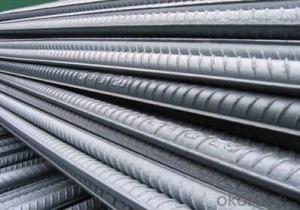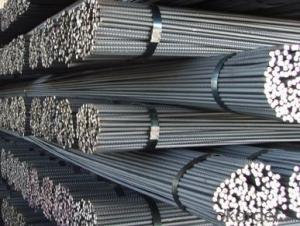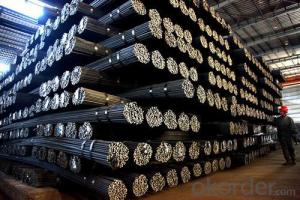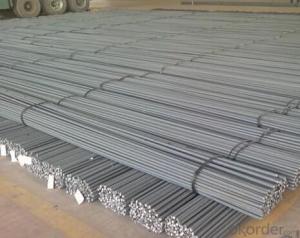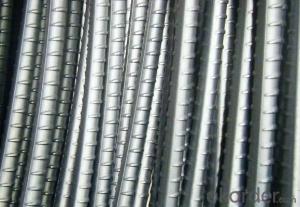CNBM Stainless Steel Deformed Bars with High Quality
- Loading Port:
- Tianjin
- Payment Terms:
- TT OR LC
- Min Order Qty:
- 50 m.t.
- Supply Capability:
- 10000 m.t./month
OKorder Service Pledge
OKorder Financial Service
You Might Also Like
Item specifice
CNBM Stainless Steel Deformed Bars with High Quality
Details of CNBM Stainless Steel Deformed Bars with High Quality
Name | Deformed Bar |
Shape | Round Bar |
Standard | 1.GB1499.2-2007, HRB335, HRB400E 2. ASTM A615 Gr.40, Gr.60 3.BS4449/1997 |
Diameter | 6mm-50mm |
Length | 6m, 8m, 9m,12m as standard or as request |
Test | SGS/UT 100% Elements Testing |
Certificate: | ISO/Mill Certificate |
Service: | 24 hours online service / |
more than 20 years trading and manufacture | |
Quality Assurance: | the third party inspection, such as SGS, BV, TUV…etc. is acceptable |
Packaging Details: | Seaworthy Packaging or as per customer's packing instruction |
Specification of CNBM Stainless Steel Deformed Bars with High Quality
Standard | Grade | Yield Strength Mpa | Tensile Strength | Elongation% |
BS4449:1997 | 250 | 250 | 295 | 22 |
460A | 460 | 485 | 12 | |
460B | 460 | 500 | 15 | |
GB1499.2-2007 | HRB335/335E | 335 | 455 | 17 |
HRB400/400E | 400 | 540 | 17 | |
HRB500/500E | 500 | 630 | 16 | |
ASTM A615 & A615M-04a | GRADE40 | 280 | 420 | 12 |
GRADE60 | 420 | 620 | 9 | |
GRADE75 | 520 | 690 | 7 | |
JIS G3112-2004 | SD295A | ≥ 295 | 440-600 | 17 |
SD295B | 295-390 | ≥ 440 | 17 | |
SD345 | 345-440 | ≥490 | 19 | |
SD390 | 390-510 | 560 | 17 | |
SD490 | 490-625 | ≥ 620 | 13 |
Size | WEIGHT | WEIGHT | QUANTITY | ||
LENGTH 6M | LENGTH 12M | LENGTH 6M | LENGTH 12M | ||
6 | 0.222 | 1.332 | 2.664 | 751 | 375 |
8 | 0.395 | 2.37 | 4.74 | 422 | 211 |
10 | 0.617 | 3.702 | 7.404 | 270 | 135 |
12 | 0.888 | 5.328 | 10.656 | 188 | 94 |
14 | 1.21 | 7.26 | 14.52 | 138 | 69 |
16 | 1.58 | 9.48 | 18.96 | 106 | 53 |
18 | 2 | 12 | 24 | 83 | 42 |
20 | 2.47 | 14.82 | 29.64 | 67 | 34 |
22 | 2.98 | 17.88 | 35.76 | 56 | 28 |
25 | 3.85 | 23.1 | 46.2 | 43 | 22 |
28 | 4.83 | 28.98 | 57.96 | 35 | 17 |
32 | 6.31 | 37.86 | 75.72 | 26 | 13 |
36 | 7.99 | 47.94 | 95.88 | 21 | 10 |
40 | 9.87 | 59.22 | 118.44 | 17 | 8 |
50 | 15.42 | 92.52 | 185.04 | 11 | 5 |
CNBM Introduction of CNBM Stainless Steel Deformed Bars with High Quality Supplier
CNBM International Corporation is the most import and export platform of CNBM group(China National Building Material Group Corporation) ,which is a state-owned enterprise, ranked in 270th of Fortune Global 500 in 2015.
With its advantages, CNBM International are mainly concentrate on Cement, Glass, Iron and Steel, Ceramics industries and devotes herself for supplying high quality series of refractories as well as technical consultancies and logistics solution.
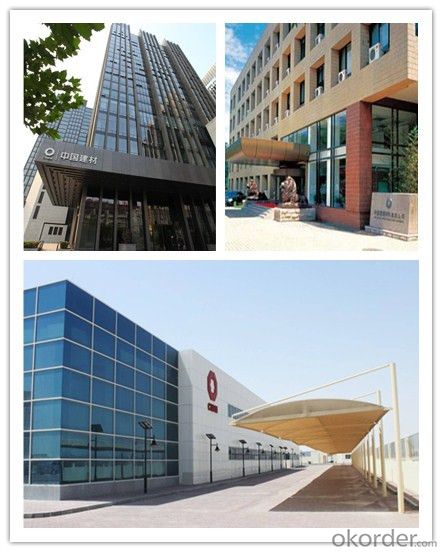
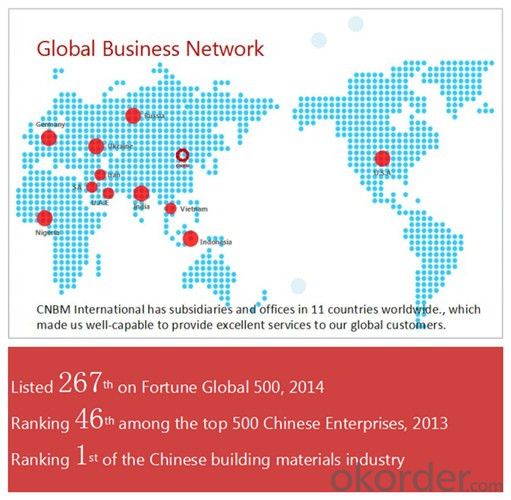
Packaging & Delivery of CNBM Stainless Steel Deformed Bars with High Quality
Packaging Detail | Sea worthy packing /as per customer's packing instruction |
Delivery Detail | 15 ~ 40 days after receiving the deposit |
Products Show
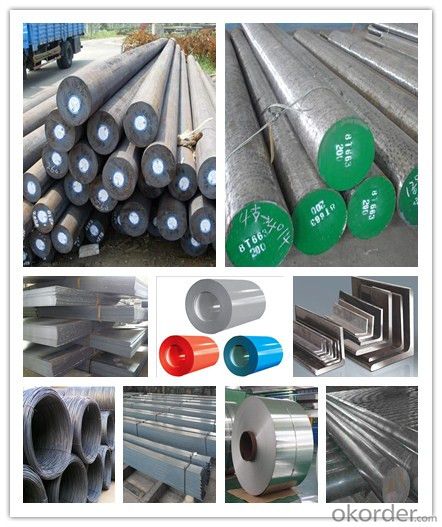
FAQ:
Are you a trading company or manufacturer? | Manufacturer |
What’s the MOQ? | 3 metric ton |
What’s your delivery time? | 15-35 days after downpayment received |
Do you Accept OEM service? | Yes |
what’s your delivery terms? | FOB/CFR/CIF |
What's the Payment Terms? | 30% as deposit,70% before shipment by T/T |
Western Union acceptable for small amount. | |
L/C acceptable for large amount. | |
Scrow ,Paybal,Alipay are also ok | |
Why choose us? | Chose happens because of quality, then price, We can give you both. Additionally, we can also offer professional products inquiry, products knowledge train (for agents), smooth goods delivery, excellent customer solution proposals. |
What's your available port of Shipment? | Main Port, China |
What’s your featured services? | Our service formula: good quality+ good price+ good service=customer's trust
|
Where are your Market? | Covering more than 160 countries in the world |
- Q:How is high-strength alloy steel used in the production of structural components?
- High-strength alloy steel is used in the production of structural components due to its exceptional strength-to-weight ratio and durability. It provides enhanced load-bearing capabilities, allowing for the construction of lighter yet stronger structures. This steel is commonly utilized in manufacturing beams, columns, and other vital components of buildings, bridges, and infrastructure projects, ensuring the structural integrity and safety of these constructions.
- Q:What are the different oil and gas grades of special steel?
- There are several different oil and gas grades of special steel that are commonly used in the industry. These grades are specifically designed to withstand the harsh environments and high temperatures associated with oil and gas exploration and production. Some of the most commonly used grades include: 1. API 5CT: This grade is specifically designed for use in casing and tubing applications. It has high strength and excellent resistance to corrosion, making it ideal for use in demanding oil and gas environments. 2. API 5L: This grade is used for pipeline transportation systems in the petroleum and natural gas industries. It has excellent mechanical properties and is designed to withstand high pressure and temperature conditions. 3. NACE MR0175/ISO 15156: This grade is compliant with the NACE MR0175/ISO 15156 standard, which specifies the requirements for the use of metallic materials in oil and gas production environments containing H2S (sour service). These grades have high resistance to sulfide stress cracking and hydrogen-induced cracking. 4. Duplex Stainless Steel: This grade is used in applications where high strength, corrosion resistance, and resistance to stress corrosion cracking are required. It is commonly used in offshore oil and gas production, as well as in subsea equipment. 5. Super Duplex Stainless Steel: This grade offers even higher strength and corrosion resistance than duplex stainless steel. It is commonly used in demanding oil and gas applications, such as subsea and deepwater equipment. These are just a few examples of the different oil and gas grades of special steel available in the market. The selection of the appropriate grade depends on the specific application, operating conditions, and requirements of the project. It is crucial to consult with experts or refer to industry standards and specifications to ensure the right grade is chosen for a particular oil and gas project.
- Q:What are the specific requirements for special steel used in the electronics industry?
- In order to meet the unique demands of the electronics industry, special steel must fulfill certain requirements. These requirements include: 1. To protect electronic components from environmental factors like moisture, humidity, and chemical exposure, special steel used in the electronics industry must have high corrosion resistance. 2. Efficient transmission of electricity within electronic devices relies on the excellent electrical conductivity exhibited by the steel. This property is crucial for the proper functioning of electronic components. 3. Depending on the application, special steel used in the electronics industry must possess specific magnetic properties. Some electronics require non-magnetic steel to avoid interfering with sensitive magnetic components, while others may need specific magnetic properties for magnetic shielding or as core material in transformers. 4. To ensure the longevity and reliability of electronic components, the steel must possess high strength and durability, enabling it to withstand the stresses and strains encountered during the manufacturing process and throughout the lifespan of the electronic device. 5. Special steel used in the electronics industry must be able to withstand high temperatures without compromising its structural integrity or electrical properties. This is particularly important in electronic devices that generate heat, such as computer processors or industrial control systems. 6. The steel must be easily formable and machinable to enable efficient manufacturing processes and the production of intricate electronic components. This allows for the fabrication of complex shapes and designs required in the electronics industry. 7. To ensure optimal performance and reliability of electronic devices, special steel used in the electronics industry should have minimal impurities and contaminants. High purity steel guarantees the absence of unwanted elements that may cause electrical or chemical interference. Meeting these specific requirements for special steel used in the electronics industry is crucial for producing high-quality and reliable electronic devices. By fulfilling these requirements, the steel can withstand the challenges and environmental conditions unique to the electronics industry, ultimately contributing to the overall performance and functionality of electronic devices.
- Q:How does special steel contribute to reducing product rejection rates?
- Special steel contributes to reducing product rejection rates by providing superior strength, durability, and resistance to corrosion. This ensures that the manufactured products meet the required specifications and perform optimally, reducing the likelihood of rejection due to quality issues. Additionally, special steel's precise composition and enhanced mechanical properties enable more accurate and consistent manufacturing processes, minimizing variations and defects that could lead to product rejection.
- Q:Can special steel be used in the construction industry?
- Yes, special steel can be used in the construction industry. It offers several advantages such as high strength, durability, and resistance to corrosion, making it suitable for various applications in construction, including beams, columns, and reinforced concrete structures. Special steel can also provide cost-effective solutions by reducing the need for additional materials and maintenance.
- Q:What are the different methods for improving the creep resistance of special steel?
- Several methods exist to enhance the creep resistance of special steel. One commonly employed technique involves alloying. By incorporating specific alloying elements like chromium, molybdenum, and vanadium, the steel's creep resistance can be significantly improved. These alloying elements create stable carbides or nitrides that serve as obstacles to dislocation movement, thereby reducing the rate of creep deformation. Heat treatment represents another effective approach. By subjecting the steel to carefully controlled heating and cooling processes, the microstructure can be refined to enhance its creep resistance. Techniques such as quenching and tempering aid in the formation of a fine-grained structure, which in turn increases the steel's strength and resistance to creep. Surface modification offers an alternative means of improving creep resistance. Nitriding and carburizing techniques can be utilized to introduce nitrogen or carbon into the steel's surface layer, creating a hardened layer that enhances creep resistance. Moreover, grain size control can be achieved through methods like grain boundary engineering or severe plastic deformation. By refining the grain structure, the movement of dislocations within the material is impeded, resulting in improved creep resistance. Lastly, the application of coatings can also bolster the creep resistance of special steel. Coatings such as ceramic or metallic coatings provide a protective layer that hampers the diffusion of impurities and slows down the creep rate. To summarize, the improvement of creep resistance in special steel can be accomplished through various techniques, including alloying, heat treatment, surface modification, grain size control, and the use of coatings. These methods aim to fortify the steel's microstructure, hinder dislocation movement, and establish protective barriers against creep deformation.
- Q:How does special steel contribute to improving product reliability?
- Special steel contributes to improving product reliability in several ways. Firstly, special steel has enhanced mechanical properties, such as high strength, toughness, and corrosion resistance, making it highly suitable for demanding applications. This ensures that products made with special steel are more durable and less likely to fail under stress or harsh conditions. Secondly, special steel can be tailored to specific requirements, allowing manufacturers to optimize the material for a particular product. This customization ensures that the steel used is the most suitable for the application, improving overall product performance and reliability. Furthermore, special steel undergoes rigorous quality control and testing processes during manufacturing. This ensures that the material meets strict standards and specifications, reducing the risk of defects or inconsistencies that could compromise product reliability. In summary, special steel's superior mechanical properties, customization options, and stringent quality control contribute to improved product reliability by enhancing durability, performance, and consistency.
- Q:How does special steel contribute to the electrical conductivity of products?
- Special steel can contribute to the electrical conductivity of products in several ways. Firstly, special steel alloys can be formulated with specific chemical compositions that enhance their electrical conductivity. For example, adding elements such as copper, silver, or nickel to the steel can increase its electrical conductivity by providing more pathways for the flow of electric current. Additionally, the microstructure of special steel can be manipulated to improve electrical conductivity. By controlling the grain size and orientation of the steel, it is possible to reduce the resistance to the flow of electrons, thereby increasing the overall conductivity of the material. Furthermore, special steel can be heat treated or subjected to other processes to enhance its electrical conductivity. Heat treatment techniques like annealing or tempering can help to remove impurities and improve the crystal structure of the steel, resulting in improved electrical conductivity. Moreover, special steel can also be designed to have low magnetic permeability, which means it exhibits less resistance to the flow of magnetic fields. This property is beneficial for applications where electromagnetic interference needs to be minimized, such as in electrical connectors or transformers. In summary, special steel contributes to the electrical conductivity of products through various means, including chemical composition, microstructural control, heat treatment, and low magnetic permeability. By optimizing these factors, special steel can significantly enhance the performance of electrical components and systems.
- Q:Can special steel be used in the production of bearings?
- Yes, special steel can be used in the production of bearings. Special steel alloys such as stainless steel or high-carbon chromium steel are often used to manufacture bearings due to their superior strength, durability, and corrosion resistance properties. These specialized steels ensure that bearings can withstand heavy loads, high temperatures, and harsh operating conditions, making them suitable for various industries, including automotive, aerospace, and manufacturing.
- Q:What are the quality control measures for special steel?
- The quality control measures for special steel typically involve several steps. First, there is a thorough inspection of the raw materials used to manufacture the steel, ensuring they meet the required specifications and standards. Next, the production process is closely monitored to ensure proper alloying and precise temperature control. Regular testing and sampling are conducted throughout the manufacturing process to check for any defects or deviations from the desired composition and properties. Specialized testing methods, such as ultrasonic or magnetic particle inspection, are utilized to identify any internal or surface defects. Finally, the finished product undergoes a final inspection to ensure it meets all the required specifications, including dimensions, mechanical properties, and surface finish. These rigorous quality control measures help to ensure that special steel meets the highest standards of quality and performance.
1. Manufacturer Overview |
|
|---|---|
| Location | |
| Year Established | |
| Annual Output Value | |
| Main Markets | |
| Company Certifications | |
2. Manufacturer Certificates |
|
|---|---|
| a) Certification Name | |
| Range | |
| Reference | |
| Validity Period | |
3. Manufacturer Capability |
|
|---|---|
| a)Trade Capacity | |
| Nearest Port | |
| Export Percentage | |
| No.of Employees in Trade Department | |
| Language Spoken: | |
| b)Factory Information | |
| Factory Size: | |
| No. of Production Lines | |
| Contract Manufacturing | |
| Product Price Range | |
Send your message to us
CNBM Stainless Steel Deformed Bars with High Quality
- Loading Port:
- Tianjin
- Payment Terms:
- TT OR LC
- Min Order Qty:
- 50 m.t.
- Supply Capability:
- 10000 m.t./month
OKorder Service Pledge
OKorder Financial Service
Similar products
New products
Hot products
Related keywords
